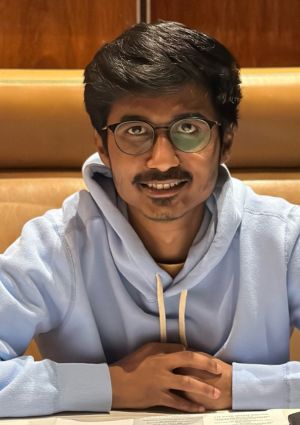In his first job out of college, as decision scientist at a data analytics firm, Abhishek Srivastava '23G learned that doctors make diagnosis and treatment decisions in essentially two ways: drawing from their clinical experience and medical knowledge and/or employing mathematical and statistical models using data.
"When I joined the company after getting my engineering degree, I got an opportunity to work in healthcare—and I liked it," says Srivastava. "I was using clinical and medical data to generate insights for physicians to make better decisions while diagnosing patients."
He felt good about the difference he was making, "but the fact that more complex algorithms were out there that I could learn, and eventually make a more significant impact in early diagnosis of patients, motivated me to do my master's in data science."
In researching graduate schools, Srivastava was drawn to Lehigh's new MS in Data Science program, in part, because it offers courses in computer vision—an application of artificial intelligence that enables computers to draw meaningful information from digital images—and biomedical image analysis.
"Those courses are completely aligned with what I do," says Srivastava, who is now a senior data scientist at Sophia Genetics, a software company that does genomic and radiomic analysis for hospitals, labs, and biopharmaceutical companies, "and what I want to do in the future, which is to use data science for personalized care."
An interdisciplinary advantage
According to Parv Venkitasubramaniam, a professor of electrical engineering and director of the MS, Data Science program, its tools and skills can be applied to a wide range of domains—basically, any field that deals with data can benefit from the insights and predictions provided by data science techniques. Lehigh's MS in Data Science program is focused on training students like Srivastava to address real-world problems in a data-driven way.
"The program brings together professors from computer science and engineering, electrical and computer engineering, and industrial and systems engineering to teach graduate students the fundamentals of data science from varying viewpoints," he says. "That approach allows students from a wide range of backgrounds to gain the qualifications necessary to tap into the wealth of data science jobs, many of which require an advanced degree."
As much as Srivastava appreciated the coursework that now compliments his day to day work, he particularly liked the multidisciplinary, interdepartmental aspect of the program—and took advantage of the research opportunities that are a hallmark of the Lehigh Engineering experience.
"I worked with professors outside of my master's program," Srivastava says. "The courses helped me to gain more in depth knowledge about hardcore machine learning and statistical data science, but I was also able to work with professor Thomas McAndrew in Lehigh's College of Health."
Srivastava collaborated with McAndrew, a computational scientist with a focus on biostatistics, to use deep learning to forecast the hospitalization rates of influenza patients to inform CDC policy.
Though Srivastava just started with his new company, he's eager to apply his knowledge and skills in data science to future projects.
"Sophia Genetics is creating this data hub, which procures data from different hospitals," Srivastava says, "and I'll get to sort of own that data and organize it, with the eventual goal of enhancing precision in personalized care."
Setting a new trajectory
When Srivastava's classmate Robert Huang '23G was in the mechanical engineering master's program at the National Taiwan University of Science and Technology, he participated in a research project that aimed to improve the manufacturing process of Tesla's electromagnetic steel sheets used in its motors.
"I really enjoyed the process of designing mathematical and statistical models, and using real data to verify the calculations and improve those models," Huang says. "As a result, I gradually developed my love for the field of data science—and that's why I decided to study it at Lehigh."
After graduating this past May, Huang joined Power Secure, which supplies microgrids to electric utilities and their industrial, institutional, and commercial customers.
"As a supply chain analyst, I must not only have strong knowledge of data science and data analysis but also sufficient understanding of the domain knowledge of the industry," Huang says. "My job often involves designing clear key performance indicator, or KPI, reports, which are models for tracking production progress, as well as forecasting models for improving supply and demand."
To design a good model, Huang needs to communicate frequently with engineers to understand every step of their production line. That's where his background in mechanical engineering is an asset in converting difficult engineering terms into easy-to-understand data.
"Lehigh taught me basic Python and SQL knowledge, but I also learned many machine learning algorithms needed by data scientists, as well as the use of big data processing tools such as Apache PySpark, Apache PyTorch, and Hadoop needed by data engineers," Huang says.
He's also found value in the program's focus on project-based learning, which gave him the opportunity to look at real-world problems from start to finish.
"This is the same process I use in my job right now," which involves mining the company's existing data for insight into enhancing efficiency, reducing costs, and making informed decisions throughout its supply chain, he says.
Switching from the manufacturing development and product design of the mechanical engineering field to data science gave Huang a new outlook on his career trajectory.
"I hope that within the next three to five years I can combine my experience as a more senior data engineer with a role in management," he says. "I don't want to limit myself to designing products. I would like to build up my expertise in how to make data-driven decisions, and Lehigh provided me with not only a foundation in data science but the opportunity to start learning those more advanced skills."
— Steve Neumann is a freelance contributor for the P.C. Rossin College of Engineering and Applied Science



